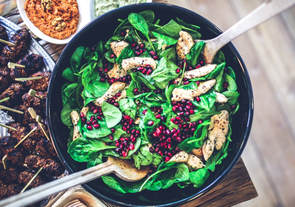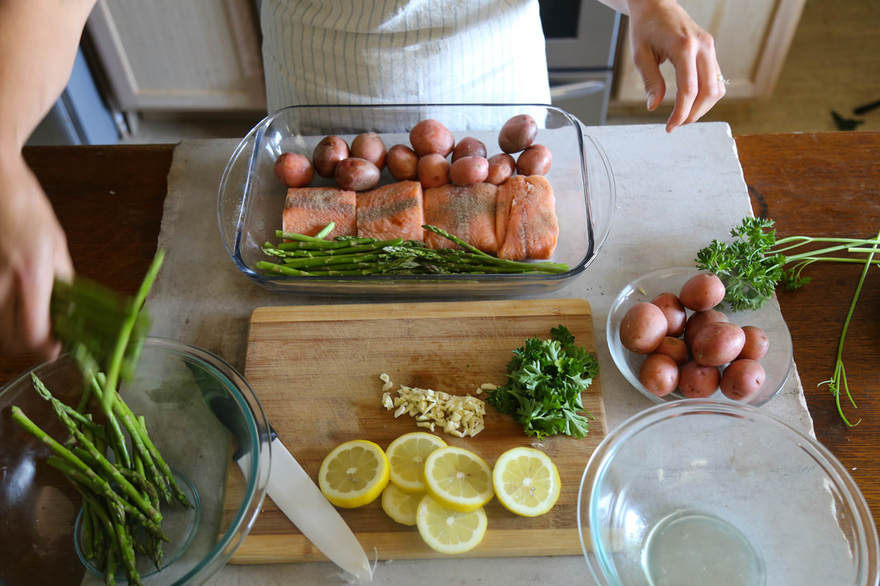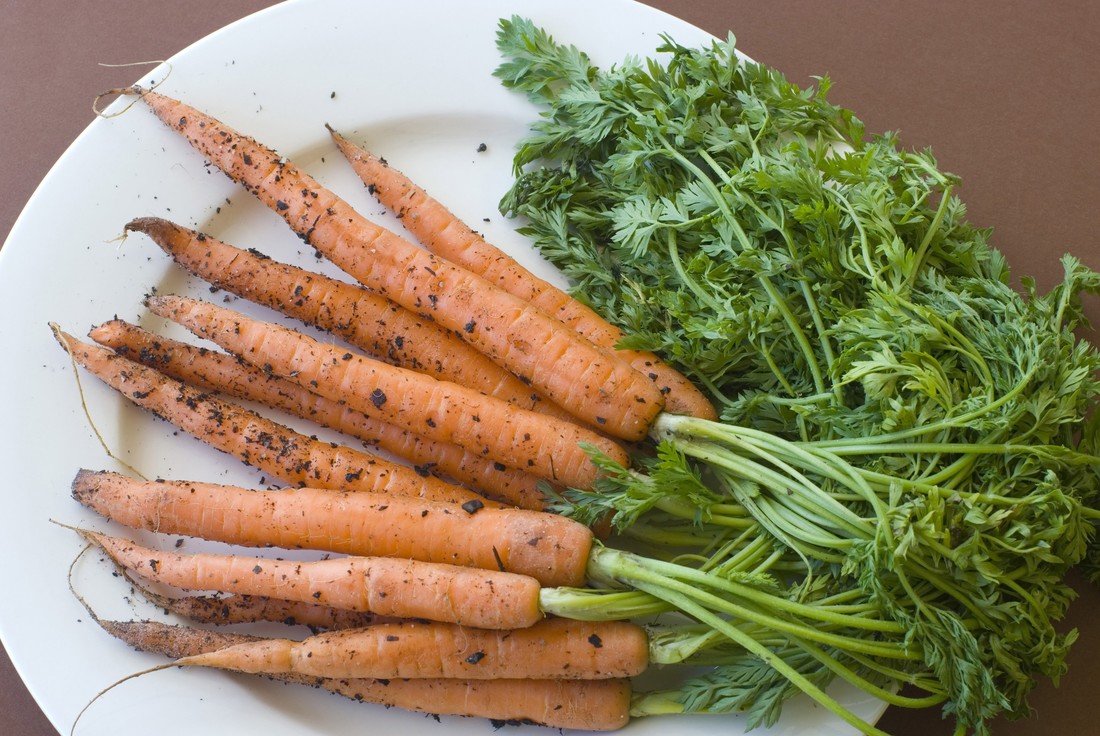|
One of my 2018 New Years Resolutions is this: Eat Ten Servings of Fruits and Vegetables Every Day.
I recently started making myself very aware of my produce intake. I consider myself a healthy eater. I eat real, whole foods and make almost everything at home. Some days were great. I would easily get the recommended amounts of F&V in, but some days were pitiful. I'd end up getting only 2-3 servings total. It is easier to do than you may realize. Have a couple eggs on toast for breakfast, a quick peanut butter and jelly sandwich for lunch, and before you know it, the day is nearing the end and dinner and a snack is all you have left. In my opinion, getting as many F&V in everyday that you can, is one of the most important things you can do for your health. So it's time to make a change. I downloaded a F&V counter app on my phone and started incorporating a daily smoothie, and more focus with each meal on a hefty source of greens. Admittedly, my pregnancy craving is fruit (Yay!), so my snacks include fresh whole fruits like apples and pears. Below I have listed a weekly grocery list that will provide enough F&V for one person to eat ten servings a day. This daily goal is broken down into 4 servings of fruit and 6 servings of vegetables. One serving of fruit is 1/2 cup or one medium sized fruit and one serving of vegetable is 1 cup raw or 1/2 cup cooked. I hope this helps inspire and ease your life into including more of these miracle rainbow foods! Grocery List:
How it looks for me on a daily basis: Fruit:
Vegetables:
2 Comments
by: Ashton Byrne  “In this plate of food, I see the entire universe supporting my existence.” - Zen blessing from Thich Nhat Hanh I want to bring us back around to one of the greatest feelings in the world, gratitude. It seems easy to separate our meals from this feeling. In fact, countries that have plenty of food tend to have more disharmony with it. Americans, worry more and enjoy less when it comes to eating than any other nation. Easy to see why, with information overload, unlimited fad diets, food rules, less time for cooking, good versus bad food, miracle foods, disease...it’s hard to just eat, and just enjoy it. Maybe we are taking our food for granted, we’re not remembering where it came from, who put work into growing it, what put energy into sustaining it, how much life and communication and intelligence it takes to provide the food we consume everyday. For one day, I invite you to stop analyzing each bite you take based on what you read or heard or saw. Instead, take a bite with gratitude. As you chew think about where the food came form, how much time and effort it took to grow and get to your table. Think about how it tastes and smells. Notice how it makes you feel after eating. Slow down and create joy in the simple things. The simple, but the big. So big- in fact, it’s one of the only things we truly need. Time, Motivation and Know-How are the biggest reasons I have found that people are not able to eat healthy, homemade meals. We live in a go-and-don’t-stop society. We work long hours and have minimal time off. I think by now we have all heard it. This is stressful, and stress is detrimental to health in all its ways, physical, mental, and emotional. Why is it so hard to find time to feed our bodies nourishing foods and meals that honor the body, mind and soul? Fast food, ready-to-eat freezer meals and meal delivery service say, you don’t have time and you shouldn’t. Often what down time we do have is filled with mindless scanning through social media, Google and watching television. We are so exhausted; the thought of standing in the kitchen at the end of a long day or on a Sunday afternoon causes fatigue in itself.
For most people, it takes a radical change to get in the kitchen. It takes reorganizing priorities and making sacrifices. Yes, I may spend 3 hours in the kitchen on most Sunday’s instead of spending time outdoors or with my friends socializing. But feeding my body with good, quality food is my priority. Yes, I may stand on my feet an extra hour at night after a long day of work to make a decent dinner. But, good food is my priority. Good food is my priority because it affects everything. It affects my health now, and in the future. I feel good, and I want to keep it that way. This is my motivation. I have seen far too many people with chronic health conditions from a life of eating poorly, that I am motivated to prevent that from happening to me. Don’t get me wrong, there are plenty of Sunday’s that I choose to travel, visit with friends and family or just take the dog for a hike. But these are the weeks where my meals are very simple and quick. I may repeat an easy, common mason jar salad for lunch, or a simple quiche for breakfast. I may just stock up on green leafy vegetables, grains and proteins for dinners that I know how to throw together easily. But no matter how busy I am, I still always have homemade meals using whole foods. I am able to do this because I have done it, over and over again, until it stuck. I am lucky to have been raised in a home where food was always homemade. We always had a homemade breakfast and a homemade dinner. It might have been the same three things every week, but at least it was real food. Eating good food is a part of who I am, all thanks to parents who made eating good food a priority. I recognize not everyone had that. Many people do not know how to be in the kitchen, so they end up eating out most meals. Unfortunately, the food system is full of ingredients that are high in empty calories and unrecognizable, highly processed ingredients. Do you ever questions why chronic disease such as diabetes, allergies, obesity and heart disease are exponentially on the rise in this country? Eating out will inevitably serve us far too many preservatives, chemicals, sugar, salt and fat. Not only very disproportionate amounts of these disease causing ingredients, but also the cheapest forms of them. Such as refined salt that does not contain essential nutrients such as Iodine, processed and refined oils which are full of chemicals, preservatives and trans fats and refined sugars such as high fructose corn syrup. These are also the addictive ingredients that keep you coming back for more. Cooking at home ensures you know exactly what is going into your body. Even if you use real butter, iodized salt and unrefined sugar, you are at least giving your body REAL food. Real food is something that your body can recognize, and use to fuel every cell and system in your body. If know-how is your reason, I have great news, there are MILLIONS UPON MILLIONS of resources. Google it, Amazon it, go to a bookstore, watch a video, listen to a podcast. You don’t have to do anything fancy. It doesn’t have to be complicated and you don’t have to jump in to cooking every single meal, every single day. But start somewhere…ANYWHERE. Maybe you start with one dinner a week. Maybe a slow cooker recipe, or a simple one-sheet pan meal. Once you learn how to cook one meal, you will gain the confidence to know you can do it again. Each time you make something new, you gain an invaluable, skill that will continue to nourish you and your family for now and for future. And remember, if you need help, planning, organizing, or cooking, we are here to help. Our main goal is to bridge the gap the separates you from living the healthy life that you want. With the warmest regards in health, Ashton I am often asked a series of questions about organic food, versus local food, versus conventional food. Do I buy all organic? How can I afford to buy organic? What is better local or organic? Is there really a difference? Unfortunately, pesticides are very loosely regulated in the United States. They are linked to terrible health consequences including cancer, birth defects, hormone disruptions, digestive disorders, nervous system disorders and more. Not to mention the havoc they wreak on the surrounding environment, as the chemicals leak into our ground, water and air.
So to answer the above questions, my quickest answer is this. First buy local from farmers you know practice sustainable farming, then buy as much organic as you can, then make sacrifices if need be. Organic plants are higher in nutrients, such as phytochemicals, which are only produced in plants that have to protect themselves from pesty invaders. (It is a defense mechanism that is needed in the natural world where pesticides, fungicides and herbicides are not present). These phytochemicals are not needed for any reason by the plant, except to protect it. However, they have been shown to have great benefit for humans in fighting disease. Organic produce contains these, conventional does not. You can chat with your local farmer to find out what there methods are and if they practice organic style farming or not. Since the organic seal is an expensive and time consuming seal to obtain, not all local farmers may have it, even if they technically are growing organic produce. That being said, when push comes to shove, and all you can do is run to the grocery store down the street, and your counting your pennies...which foods are most important to buy organic? Below I have listed the Environmental Working Groups list of top 12 foods with the most amount of pesticides found which should be bought organic and the top 15 foods with the least amount of pesticides which are safer to buy non-organic. EWG's Dirty Dozen- Foods to be sure you buy organic 1. STRAWBERRIES 2. SPINACH 3. NECTARINES 4. APPLES 5. PEACHES 6. PEARS 7. CHERRIES 8. GRAPES 9. CELERY 10. TOMATOES 11. SWEET BELL PEPPERS 12. POTATOES +1. HOT PEPPERS EWG's Clean Fifteen- Foods you can skimp on buying organic if need be 1. Sweet Corn (though I would argue with this as far as GMO's are concerned) 2. Avocado 3. Pineapple 4. Cabbage 5. Onions 6. Sweet Peas frozen 7. Papayas 8. Asparagus 9. Mangoes 10. Eggplant 11. Honeydew 12. Kiwi 13. Cantaloupe 14. Cauliflower 15. Grapefruit I am also pretty strict on the type of animal products I invite into my diet for the same reasons listed above. The nutrient content is richer in animals humanely raised without pesticide and GMO rich feed. It is also light-years better for our environment. Again, I think the best advice is to buy as much organic as you can. Local, sustainably grown and raised is the best. Then go from there. And remember it is an investment in your health, and the health of generations to come. I whole-heartedly believe that we have to put our best foot forward to fight the environmental and health injustices that are at our forefront today. We are simply not living a sustainable lifestyle, something has got to give! With the warmest regards, Ashton References http://www.ewg.org/ http://www.eatingwell.com/food_news_origins/organic_natural/dirty_dozen_plus_14_foods_you_should_buy_organic http://www.phytochemicals.info/ |
AuthorWrite something about yourself. No need to be fancy, just an overview. Archives
January 2018
Categories |


 RSS Feed
RSS Feed
